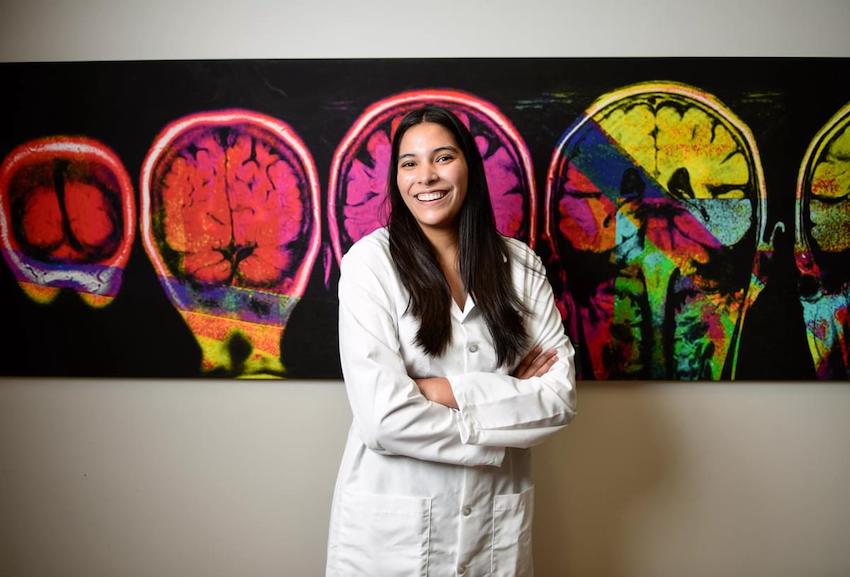
Social Work Student Conducts Alzheimer’s Research Through BUILDing SCHOLARS Program
Though there is still much to learn about neurodegenerative diseases like Alzheimer’s, UTEP junior social work major Anamaria Solis spent her summer contributing to the growing bed of research surrounding the disease. As part of the BUILDing SCHOLARS program, she spent three months at the Arizona State University helping to research the link between blood biomarkers in women and the likelihood of developing neurodegenerative diseases.

Working under Edward Ofori, Ph.D., assistant professor and director of the Pathomechanics and Neuroimaging Lab at the Arizona State University, her research sought to identify a link between the presence of female hormones in a person’s body and their chances of later developing Alzheimer’s and other similar diseases. Solis performed statistical analysis looking at these hormones – which occur in higher rates in females and lower rates in males – and testing to see if there was a correlation with the Alzheimer’s disease spectrum. She used neuroimaging data to analyze the nervous system and brain in a non-invasive manner.
“We had individuals who were cognitively normal to people who had been diagnosed with Alzheimer’s, and we tested to find a correlation,” Solis said. “We did find significant association, especially in men, which was unexpected.”
Solis is one of 18 UTEP students in this year’s cohort of BUILDing SCHOLARS, which stands for Building Infrastructure Leading to Diversity: Southwest Consortium of Health-Oriented Education Leaders and Research Scholars. The BUILDing SCHOLARS program is designed to provide students with the opportunity to conduct research under the guidance of established researchers at one of 10 partner universities. Funded by a 10-year grant from the National Institutes of Health, UTEP is one of 10 nationwide “BUILD” sites, with 156 UTEP students supported since its inauguration.
“We’ve taken a holistic approach to the students that we welcome [to the program],” said Evelyn Lopez, assistant director of the BUILDing SCHOLARS program. “We welcome incoming freshmen, students who transfer from community colleges as well as current UTEP students. We push our students to get out of their comfort zones. They get to identify themselves as researchers, and I feel that gives them the leverage that they need to also continue with more advanced degrees.”
BUILDing SCHOLARS was founded with the goal of supporting students from backgrounds that are historically underrepresented in STEM and research-driven fields. Ofori, who has worked with two BUILDing SCHOLARS recipients so far, discovered his passion for helping budding researchers when he had his own opportunity as a graduate student to conduct research at the University of Tennessee through the McNair Scholars Program, which was founded with the similar goal of supporting historically underrepresented and first-generation college students.
“I didn’t think I was going to go to graduate school as an undergraduate,” Ofori said. “But I got into the McNair Scholars Program, and that changed my life. So, as a faculty member with an opportunity like this, I lit up at the opportunity.”
In addition to the research opportunities available through the program, students also gain access to leadership development opportunities, funding and a cohort of like-minded individuals who help support them throughout their collegiate journeys. The grant has also provided opportunities to bring on new faculty to UTEP who focus on research-driven courses for students.
Solis always had the goal of working in a field that allowed her to give back to her hometown of El Paso and those who live there. She had originally planned to major in education, but with all the changes brought on by the COVID-19 pandemic, she changed courses and landed on social work, which she found to be a happy middle.
“I always knew I wanted to do something that was community-based and was really relationship focused, and social work seemed like the career path where I would have the broadest opportunities,” Solis said. “I could examine and explore different avenues of my interests, like being able to do public health research while also doing community service.”
As a UTEP student, she has had the opportunity to conduct research on pregnancy health under the tutelage of Carina Heckart, Ph.D., a medical anthropologist and professor with UTEP’s Department of Sociology and Anthropology. Looking to the future, Solis is interested in working in public policy and hopes to continue her research in graduate school.
“In terms of policy, I was always interested in politics and reproductive health care,” Solis said. “I know from personal experience it can be difficult [navigating health care] as women of color, and I can see it through my research as well. When I understood that connection, I realized that’s what I wanted to continue to explore.”
Her experience through the BUILDing SCHOLARS program allowed her to connect the dots between her desire to work in public policy and to build the skills needed to conduct STEM research.
“Dr. Ofori was really helpful,” Solis said. “I hadn’t had much experience with SPSS Statistics, which was the coding software that I used. [The program] helped with the more physiological aspects of the work that I’ve been doing because I hadn’t gotten into the STEM side of it, yet. They were very gracious there.”
Though the BUILDing SCHOLARS program was funded through a 10-year grant, once the grant ends, UTEP will continue providing this opportunity to students through the Campus Office of Undergraduate Research Initiatives, so that students like Solis can continue to have opportunities to grow as researchers. To learn more about the BUILDing SCHOLARS program, visit https://buildingscholars.utep.edu/web/.
Last Updated on September 06, 2023 at 12:00 AM | Originally published September 06, 2023
By Julia Hettiger UTEP Marketing and Communications
